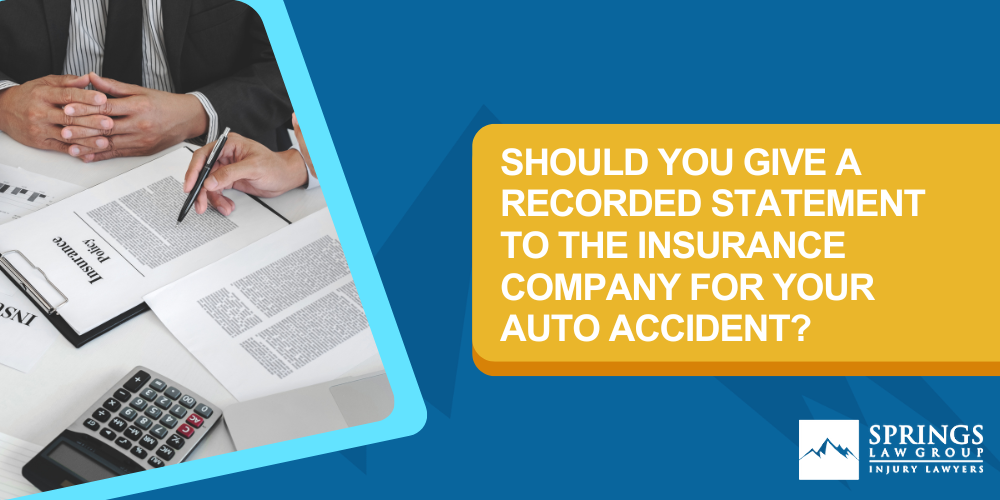Should you give a recorded statement to the insurance company for your auto accident?


Hi, I’m Jake Kimble. I’m one of the partners at Springs Law Group, and I want to talk to you about recorded statements in the context of an auto accident.
Oftentimes, almost every time your insurance company and the at-fault driver’s insurance company want to take a recorded statement from you regarding the accident, they have to tell you it’s recorded. Sometimes, people will say, “Well, I don’t know if I gave a recorded statement.” You’ll know because they’re required to say, “This is being recorded. Do I have your permission to do it?” And then you have to say yes; if you say no, then they can’t take it. So you should know that it’s happening, the purpose of the recorded statement for the insurance company, their stated purpose (if it is to get all the facts regarding how the accident happened), and your injuries. However, I would caution you against these because one of the primary ways in which a recorded statement is used is against you to deny your claim.
So, for example, they may ask at the very beginning of your case, “What are your injuries?” Maybe you don’t understand what your injuries are. Perhaps you only know that your doctor told you whiplash, but you don’t know what that means because you’re not a doctor. And so then you say something. Or, if you’re like me, and you got kids, and whenever you get on the phone, your kids are there to track it like a magnet to you. You’re trying to listen, but you’re distracted. And you say something that you didn’t mean to say.
In my opinion, you’re better off asking an attorney for advice; you are not required to give a recorded statement to the at-fault driver or the at-fault driver’s insurance company. If they ask and you haven’t hired an attorney, one thing you can say is, “I don’t know; let me think about that.” And then, you can talk to an attorney and get their advice on it.
Often, your own insurance company will want to take your recorded statement. Again, I would consult with an attorney on this because of your policy documents. When it’s your own insurance company, there’s a contract between you and your insurance company that you’re required to follow. So you don’t want to violate that contract unwittingly by saying, “Oh, no, I’m not gonna give a recorded statement.” If it’s your own insurance company, you may be required to give one, and if it’s the other person’s insurance company, then you may often turn that down, especially if there’s a police report. It’s unnecessary.
You probably heard the Miranda warning, which is, “Anything you say or do can be used against you in a court of law.” I would apply that to the recorded statement too. So if you’re going to give one, make sure that you are in a quiet place where you can think about what the questions are, and make sure that you take a minute to think about it before you answer. And make sure you understand what you’re saying before you say it. So if you’re in the car driving along and they call you and want a recorded statement, I wouldn’t do it then because you need to be paying attention to the road, for example, or if you’re at work, not a good time either because there are too many distractions. So as always, if you have an attorney, talk to the attorney, and get their advice on that. They’ll be able to steer you in the right direction.
Don’t endure the mental gymnastics of giving statements to insurance companies without legal advice from your Colorado personal injury attorney. Contact a personal injury lawyer at Springs Law Group in Colorado Springs to set up a free consultation and discuss your legal options.
Here are more helpful resources:
